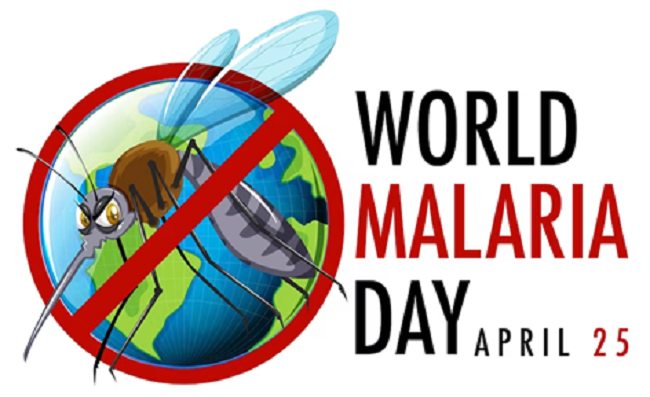Malaria is a deadly disease caused by parasites that are transferred to humans through the bites of infected female Anopheles mosquitoes. In humans, Malaria can be caused by five species of parasites. Out of these five, Plasmodium falciparum is the deadliest one.
Malaria has many symptoms including fever, headache, chills, and flu-like sickness. These symptoms can sometimes advance to serious complications such as anaemia, respiratory distress, and organ failure. Malaria can be treated with antimalarial drugs, but quick and precise detection is required for effective treatment.
It has become a global crucial public health worry, especially in some parts of Africa. It is estimated that there were 229 million malaria cases worldwide in 2019, with 409,000 deaths, mostly among children under five.
What is World Malaria Day?
World Malaria Day is an annual event observed on April 25th to raise awareness about malaria and advocate for better control and prevention measures. This day was established in 2007 by the World Health Assembly which is the decision-making body of the World Health Organization (WHO).
World Malaria Day provides an opportunity to highlight the global effort to fight malaria and to mobilize resources to accelerate progress towards eliminating the disease. The theme for World Malaria Day changes each year to reflect the current priorities in the fight against malaria.
There are many activities that are organized to mark this day. Public awareness campaigns, community events, educational activities, and scientific seminars are a few of them. These activities focus on engaging people around the world in the fight against malaria and promoting the importance of sustained political commitment and investment to control and eliminate the disease.
Importance of World Malaria Day
The Importance of World Malaria Day lies in its ability to raise awareness about malaria and its impact on global health. Malaria is a preventable and treatable sickness, yet it continues to affect millions of people globally, It particularly affects people in poor-income countries that have limited healthcare options.
World Malaria Day acts as a platform for supporting better control and prevention measures. This includes the distribution of insecticide-treated bed nets, access to diagnostic tests and effective antimalarial drugs, and investments in research and development for new tools to fight the disease.
The day also gives an opportunity to commemorate the advancement that has been made in the fight against malaria so far. Although global efforts have led to a drastic depletion in the number of cases and deaths in recent years, particularly among younger children, there is definitely much more that needs to be done to accomplish the ambitious target to eradicate malaria completely.
In summary, the importance of World Malaria Day is in spreading awareness, utilizing resources, and recommending sustained political commitment and investment to control and eliminate malaria, a disease that continues to affect millions of people worldwide.
World Malaria Day Activities
There are many different types of World Malaria Day Activities that can be arranged. Here are a few examples:
- Public awareness campaigns: These can take many forms, such as billboards, posters, social media campaigns, and public service announcements to spread awareness.
- Community events: These can include rallies, marches, and other public gatherings. They provide a platform to engage with people at the most basic level and spread awareness about the effect of malaria on their communities.
- Educational activities: Schools, universities, and other educational institutions can organize workshops and seminars to spread awareness among students about malaria and the importance of prevention and treatment.
- Fundraising events: These can include charity runs, benefit concerts, and other fundraising initiatives to raise funds for malaria research, prevention, and treatment.
- Health screenings and treatment programs: These can include community-based malaria testing and treatment programs, as well as campaigns to distribute insecticide-treated bed nets to vulnerable populations.
- Host a movie screening – You can organize a screening of a documentary or movie about malaria to educate and raise awareness about the disease.
- Donate to a malaria charity – You can donate money to a charity that is working to prevent and treat malaria, such as the World Health Organization’s Roll Back Malaria Partnership or the Malaria No More organization.
- Advocate for malaria prevention –You can write to your local government officials or representatives to advocate for increased funding for malaria prevention and treatment programs.
- Organize a community clean-up – You can organize a community clean-up to remove mosquito breeding sites and reduce the risk of malaria transmission.
- Distribute mosquito nets – You can distribute mosquito nets to people in your community to help protect them from malaria.
- Conduct a research project – You can conduct a research project to investigate the prevalence of malaria in your community, identify risk factors, and develop prevention strategies.
These are just a few examples of the World Malaria Day Activities that can be arranged. The most effective activities are those that engage people at the local and basic level and empower them to take actions to prevent and control malaria within their communities.
World Malaria Day Theme
The World Malaria Day Theme changes each year to reflect the current priorities in the fight against malaria. The World Malaria Day Theme is selected by the World Health Organization (WHO) in collaboration with its partners and other stakeholders.
The selection of the World Malaria Day Theme is a joint effort and combined process that involves inputs from a wide range of stakeholders. The theme is designed to inspire action and mobilize resources to accelerate progress towards eliminating malaria.
The theme is usually announced a few months before World Malaria Day to give organizations and individuals around the world time to plan their activities and campaigns. The theme is also reflected in the messages and materials that are produced by the WHO and other organizations to promote World Malaria Day.
Listed here are the World Malaria Day Theme for the past few years:
2021: “Reaching the zero malaria target”
2020: “Zero Malaria Starts with Me”
2019: “Zero malaria starts with me”
2018: “Ready to beat malaria”
2017: “End Malaria for Good”
2016: “End Malaria for Good: What Will It Take?”
2015: “Invest in the future: defeat malaria”
The World Malaria Day Theme for 2022 has not yet been announced by the World Health Organization.
Conclusion
In conclusion, World Malaria Day is an annual event observed on April 25th to increase awareness about malaria, promote better control and prevention measures, and commemorate the development that has been made in the fight against this disease so far. Malaria continues to affect millions of people globally, especially in poor-income countries with limited healthcare options.
World Malaria Day provides an opportunity to engage people at the local and global levels and to promote sustained political commitment and investment to control and eliminate malaria. The theme for World Malaria Day changes each year to reflect the current priorities in the fight against malaria. We mentor our students to understand that it is important to continue the efforts to avoid, identify and treat malaria to achieve the global goal of eradicating this deadly disease forever.










